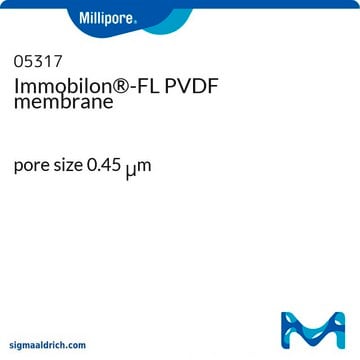IPVH00010
Immobilon® -P PVDF Membrane
1 roll, 27 cm x 3.75 m, 0.45 µm pore size, transfer membrane
Synonym(s):
Western blotting membrane, blotting membrane, transfer membrane
About This Item
Recommended Products
product name
Immobilon®-P PVDF Membrane, 1 roll, 27 cm x 3.75 m, 0.45 µm pore size, Hydrophobic PVDF Transfer Membrane for western blotting.
material
PVDF membrane
plain filter
white filter
Quality Level
feature
hydrophobic
manufacturer/tradename
Immobilon®
technique(s)
dot blot: suitable
western blot: suitable
filter L × W
27 cm × 3.75 m
pore size
0.45 μm pore size
capacity
160 μg/cm2 adsorption capacity (insulin)
215 μg/cm2 adsorption capacity (BSA)
294 μg/cm2 adsorption capacity (goat IgG)
compatibility
for use with Amido black
for use with CPTS
for use with Colloidal gold
for use with Coomassie brilliant blue
for use with India ink
for use with Ponceau-S red
for use with Sypro<TMSYMBOL></TMSYMBOL> ruby
for use with Toluidine blue
for use with Transillumination
detection method
chemiluminescent
colorimetric
fluorometric
radioactive
shipped in
ambient
General description
Features and Benefits
- Won′t crack, curl or fracture when cut
- Low background
- Superior staining capabilities
- Can be reprobed multiple times
Linkage
Other Notes
Legal Information
Storage Class Code
11 - Combustible Solids
WGK
WGK 3
Flash Point(F)
Not applicable
Flash Point(C)
Not applicable
Certificates of Analysis (COA)
Search for Certificates of Analysis (COA) by entering the products Lot/Batch Number. Lot and Batch Numbers can be found on a product’s label following the words ‘Lot’ or ‘Batch’.
Already Own This Product?
Find documentation for the products that you have recently purchased in the Document Library.
Customers Also Viewed
Articles
Comparison of elution techniques for small-scale protein purification of FLAG® tag proteins using anti-FLAG® M2 magnetic beads.
Protocols
This page shows and discusses three protocols for stripping and reprobing a western blot membrane.
Protocol for sample preparation for cell lysis and efficient protein extraction from cultured tissues and cells for subsequent Western blotting.
Protocol for sample preparation for cell lysis and efficient protein extraction from cultured tissues and cells for subsequent Western blotting.
Protocol for sample preparation for cell lysis and efficient protein extraction from cultured tissues and cells for subsequent Western blotting.
Our team of scientists has experience in all areas of research including Life Science, Material Science, Chemical Synthesis, Chromatography, Analytical and many others.
Contact Technical Service








